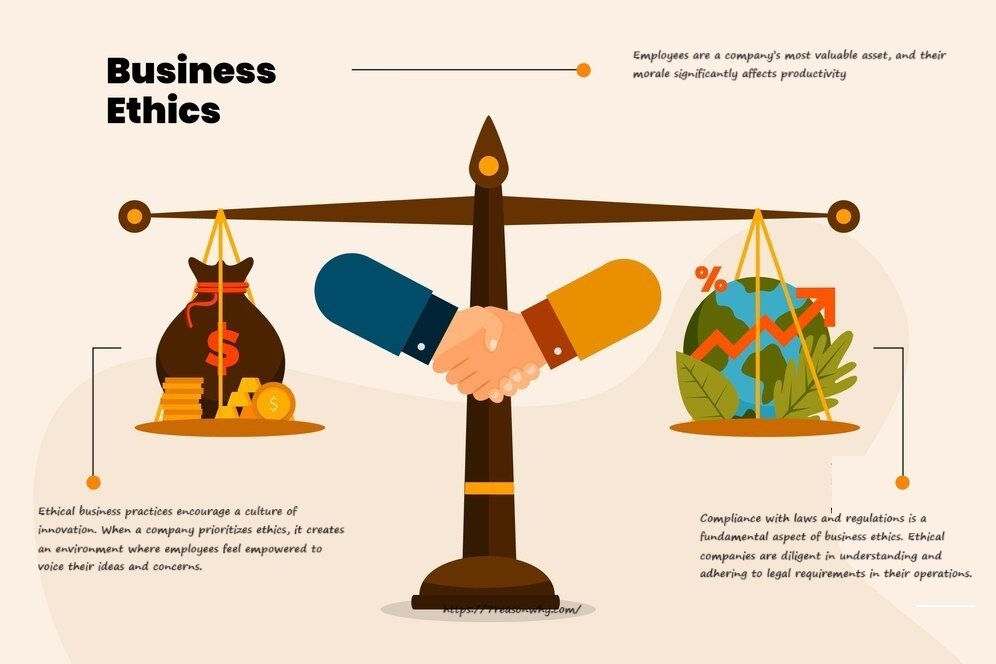Today highly competitive and globalized market, the importance of business ethics cannot be overstated. Ethical practices in business are not just a matter of compliance with laws and regulations but are essential for long-term success and sustainability. Here are 7 reasons why business ethics is important is crucial for any organization. Business ethics, which refers to the principles and standards that guide behavior in the world of commerce, is foundational to the trust and integrity of any organization.
7 Reasons Why Business Ethics is Important
1. Builds Trust with Customers
Trust is the cornerstone of any successful business relationship. When a company operates ethically, it fosters a sense of trust among its customers. Ethical behavior includes honesty in advertising, transparency in pricing, and accountability in business practices. Customers are more likely to return to businesses they trust and recommend them to others. This trust translates into customer loyalty, which is invaluable for sustained business growth.
For instance, companies like Patagonia and TOMS have built their reputations on ethical practices, earning customer trust and loyalty by being transparent about their supply chains and committing to social causes.
2. Enhances Employee Morale and Productivity
Employees are a company’s most valuable asset, and their morale significantly affects productivity. When a company adheres to ethical standards, it creates a positive work environment. Employees feel valued and respected, which boosts their morale. Ethical practices ensure fair treatment, non-discrimination, and equal opportunities, fostering a sense of belonging and commitment among employees.

Companies with strong ethical values tend to have lower turnover rates, as employees prefer to stay with organizations that align with their personal values. High employee retention saves costs related to hiring and training new staff, further enhancing productivity and efficiency.
3. Protects the Company’s Reputation
In the age of social media and instant communication, a company’s reputation can be easily tarnished by unethical behavior. Scandals, fraud, and malpractice can quickly become public, leading to a loss of customer trust and a damaged reputation. Recovering from such a blow can be extremely difficult and costly.
Adhering to ethical principles protects a company from such risks. A good reputation built on ethical practices not only attracts customers but also partners, investors, and top talent. It positions the company as a leader in its industry, setting a standard for others to follow.
4. Attracts and Retains Investors
Investors are increasingly looking at a company’s ethical practices before deciding to invest. Ethical companies are seen as lower-risk investments because they are less likely to encounter legal issues, regulatory fines, and reputational damage. Ethical behavior demonstrates good governance, transparency, and accountability, which are critical factors for investors.
Moreover, with the rise of socially responsible investing (SRI), many investors prefer companies that align with their values. Ethical companies attract this growing segment of investors, providing them with the capital needed for expansion and innovation.
5. Ensures Legal and Regulatory Compliance
Compliance with laws and regulations is a fundamental aspect of business ethics. Ethical companies are diligent in understanding and adhering to legal requirements in their operations. This vigilance helps avoid legal issues, fines, and sanctions that can arise from non-compliance.
By prioritizing ethics, companies stay ahead of regulatory changes and can adapt quickly to new requirements. This proactive approach not only protects the company legally but also demonstrates its commitment to operating responsibly and ethically.
6. Promotes Long-Term Sustainability
Sustainability is a key concern in the modern business world. Ethical business practices contribute to sustainability by considering the long-term impact of business activities on the environment and society. This includes responsible sourcing of materials, reducing waste, minimizing carbon footprint, and ensuring fair labor practices.
Companies like Unilever and IKEA have integrated sustainability into their core business strategies, demonstrating that ethical practices and profitability can go hand in hand. By focusing on sustainability, businesses not only protect the planet but also secure their future by meeting the growing demand for responsible products and services.
7. Fosters Innovation and Growth
Ethical business practices encourage a culture of innovation. When a company prioritizes ethics, it creates an environment where employees feel empowered to voice their ideas and concerns. This openness fosters creativity and innovation, leading to new products, services, and business models.
Furthermore, ethical companies are more likely to engage in fair competition, which drives innovation across the industry. By setting high ethical standards, companies challenge themselves and others to improve continually, leading to overall industry growth and development.
Conclusion
Business ethics is not just about following rules, It’s about creating a culture of integrity, trust, and responsibility. Ethical companies build strong relationships with customers, employees, and investors, protect their reputations, ensure compliance, and contribute to sustainability. They foster an environment of innovation and growth, positioning themselves for long-term success in an ever-evolving market.
In a world where consumers and stakeholders are increasingly conscious of ethical considerations, businesses cannot afford to overlook the importance of ethics. By committing to ethical practices, companies can achieve a competitive advantage, build lasting relationships, and make a positive impact on society and the environment. Ethics, therefore, is not just good business; it is the foundation of sustainable and responsible growth.



